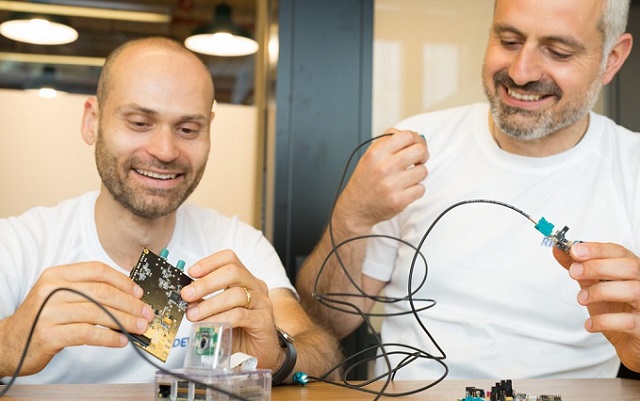Startup Ride Vision Makes Motorcycle Riding Safer
Ride Vision just brought in $7 million to develop its AI tech.
Israeli startup Ride Vision provides collision-aversion technology (CAT™). It has now launched internationally its AI-driven, safety-alert technology which can help prevent motorcycle collisions on the road. Ride Vision just brought in $7 million in Series A funding, totaling $10M to-date, as well as a partnership with the automotive giant Continental AG.
Ride Vision develops an Advanced Rider Assistance System (ARAS) for motorbike accidents prevention utilizing advanced computer vision & AI algorithms which it boasts does not disturb the riders’ focus.
Riding motorcycles on the open highway is known for being a dangerous way to travel. Twenty eight percent of all fatal road accidents are reportedly from motorcycle riders. That includes all the people who get around town in smaller types of vehicles like Vespas and motor scooters. Just watch these riders try and zip around the cars stuck in traffic on a daily basis and you will see why they are so dangerous.
This is where Ride Vision’s tech comes in.
The company’s system uses a combination of image-recognition and AI technologies. Ride Vision states that its patented human-machine warning interface (HMI) and predictive vision algorithms help riders make critical life-saving decisions in real time. The hardware includes two wide-angle cameras mounted on both the front and rear of the vehicle, unique alert indicators placed on the mirrors, and an onboard main computing unit that stores Ride Vision’s patented algorithms.
Based in Herzliya, the company was founded in 2018 by its CEO Uri Lavi and its CTO Lior Cohen. The duo say that they know what bikers need to stay safe because they are motorcycle enthusiasts themselves. Their company vision is to provide riders with accessible, affordable, and lifesaving technology.
–
[embedded content]
“As motorcycle enthusiasts, we at Ride Vision are excited at the prospect of our international launch and our partnership with Continental,” Uri Lavi, CEO and Co-Founder of Ride Vision, says. “This moment is a major milestone, as we stride toward our dream of empowering bikers to feel truly safe while they enjoy the ride.”
“We are proud to be leading this investment round in Ride Vision,” says Jon Medved, OurCrowd CEO. “This company has both a cutting edge product for this huge underserved market, and the ability to save so many lives. It doesn’t get better than this.”
“I’m very excited to join the Ride Vision advisory board. Saving lives and reducing road accidents using technology has always been my passion and Ride Vision’s technology gets us closer to saving riders’ lives all over the world”, says Christian Weber, Head of ADAS at Continental.
“It is an honor to have been chosen by Ride Vision as a board member advisor,” says Livia Cevolini, CEO Energica Motor Company S.p.A. “Technology combined with rider’s safety has always been one of the cornerstones of our business. Sharing skills and experience can only lead to technological growth aimed at life-saving innovation.”
Uri Lavi is a passionate visionary and an experienced motorcyclist. He was previously the CEO at PicScout. Before that Uri held leadership positions at a variety of other companies, ranging from startups to multinationals. He has also managed teams in the insurance and homeland security sectors.
Uri holds a B.Sc. in Software Engineering from the Technion in Haifa.
Lior Cohen is an avid motorcyclist, and is passionate about combining artificial intelligence and user-friendly hardware to make motorcycling safer. Before Ride Vision he was the VP of Research and Development at PicScout, where he led a team of visual algorithm researchers and engineers.
Prior to that Lior lead mobile and homeland security development teams which also worked with complex algorithmic problems.
Lior holds a M.Sc. in Information System Engineering from Ben Gurion University.
Read more about: CAT™, Lior Cohen, Ride Vision, Uri Lavi




